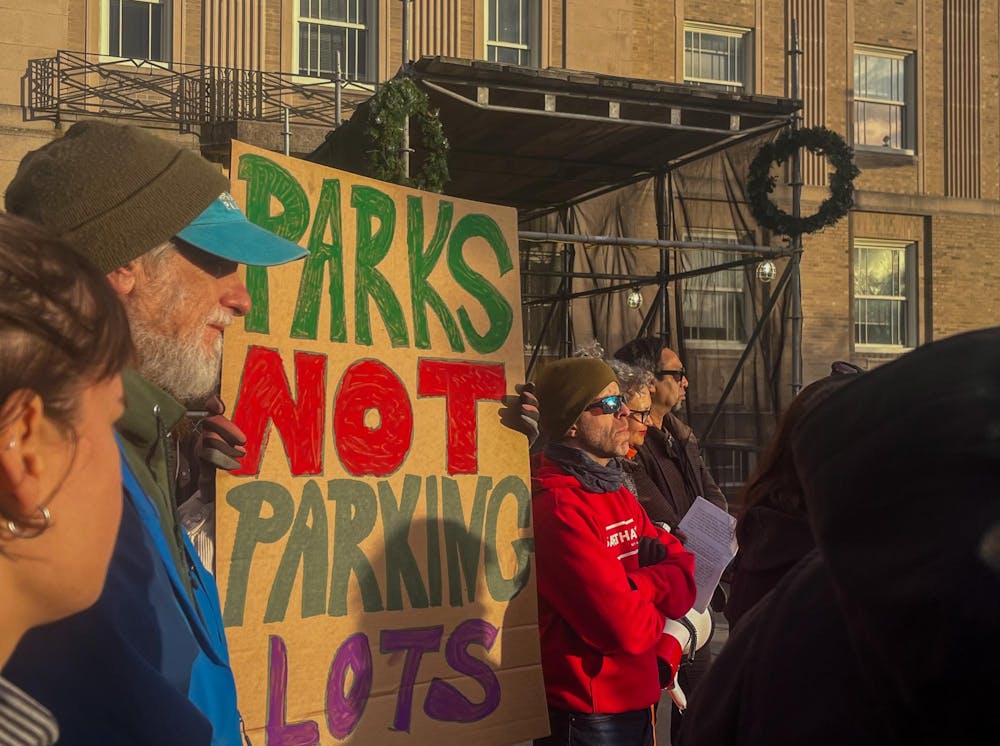Over a year ago, Pawtucket city officials closed down a portion of Morley Field, the only park within the surrounding neighborhood of Woodlawn and a community hub for the area’s historically low-income, BIPOC community.
The park was shut down due to “environmental contamination,” Pawtucket Mayor Don Grebien wrote in an email to The Herald.
Community members hoped that the portion would open back up after the environmental issues had been addressed. Instead, it might soon become a parking lot.
Sunday afternoon, over 70 people gathered outside Pawtucket City Hall to protest the city’s plans to sell the parcel of land to JK Equities and construct a parking lot for an adjacent property.
Over 600 supporters have signed a petition demanding the city to reopen and maintain Morley Field as a public park. The petition cites “public health, air quality and the climate” as major concerns with the planned redevelopment.
State representatives, local residents, environmental activists and members of the Brown’s Sunrise organization attended the rally.
Organizers say access to the park is an issue of environmental justice. According to Uprise RI, the Woodlawn neighborhood is “approximately 74% people of color” and 59% of people live at or below the poverty rate.
Pawtucket City Councilor Clovis Gregor, who represents the Woodlawn neighborhood in the City Council, called the development of Morley Field a “moral injustice.” Gregor grew up playing at the ballpark, as did his older children, but his youngest son has not been able to do so recently due to the closure.
Johnny Santos, who also grew up playing at Morley Field, said that for many Pawtucket residents, parks are the only outdoor spaces available to play sports and socialize.“When you’re from Pawtucket, we’re not graced with acre lots,” he said at the rally. “Most of us don’t have backyards.”
Santos said he would like to see Morley Field redeveloped into the “beautiful field” it once was, and hoped for additions like a walking space, a bike path and other amenities.
“Our kids need to have a place they can walk to and have a picnic, play basketball or play baseball,” he said.
According to Jed Thorp, director of advocacy at Save The Bay, the potential parking lot also poses a threat to the environment.
“Every bit of green space matters,” Thorp said at the rally, explaining that replacing green space such as Morley Field with pavement and parking lots contributes to storm water pollution in Narragansett Bay. Green spaces slow and capture stormwater runoff by increasing water infiltration, according to the U.S. Department of Agriculture.
State Representative Jennifer Stewart (D-Pawtucket), who represents the Woodlawn community in the General Assembly, added that the Morley Field closure has “been bringing the community down.”
But Mayor Grebien wrote that the sale would provide the “much-needed” funding to allow the city to make larger purchases of land that can be used for “enhanced, recreational opportunities for the community, including public access to the river.”
“All environmental justice requirements will be met and this conversion will have great benefits to the community,” Grebien added.
But for some residents, the city’s planned green spaces do not fill the gap that closing Morley Field will leave. Ben Evans, a Pawtucket resident, argued that opening green spaces in locations other than Morley Field will not benefit a community that is “working class” and “majority people of color.”
“That just seems fundamentally unfair,” Evans said in an interview with the Herald.
But for Grebien, the sale of Morley Field will also spur economic benefits, outside of generating funds to support new green spaces. The sale and development of the property next to the park, for which the closed portion of Morley Field will become a parking lot, is projected to create more than 500 jobs, he explained.
Gregor is also not convinced that the change will be a positive one for the community, calling the promise of 500 new jobs a “fabricated exaggeration.”
“We have a city government that would rather sell off community assets for a hollow promise of economic development,” Stewart said.
In an interview with the Herald, Stewart said she hopes that the outcome of the rally will be that “many people will get in touch with the city to say loudly that we want Morley Field in its entirety, maintained and well resourced, and reopened.”
JK Equities did not reply to The Herald’s request for comment.
Around 15 Sunrise Brown members attended the Sunday rally.
Isha Thakkar ‘27, Sunrise’s community task force co-lead, called Morley Field an “intersection between environmental justice and public health.”
For her, students at Brown have a responsibility to support issues like Morley Field. “As students with the privilege that we have, we need to show up for our community.” she said in an interview with the Herald.





